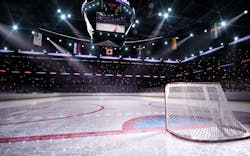National Hockey League and Chemours Partner for Sustainability at Skating Venues
NEW YORK/TORONTO (May 22, 2018) – The National Hockey League® (NHL) and The Chemours Company today announced a multi-year partnership focused on providing Opteon™ sustainable refrigerant solutions to rinks across North America.
The partnership announcement follows the release of the 2018 NHL Sustainability Report which assesses the NHL’s environmental impact and its commitment to ensure all levels of hockey – on frozen ponds, community rinks, or in-arena – thrive for future generations, and supports the NHL Greener Rinks Initiative, a League-wide program committed to sharing sustainable business practices with community rink owners and operators.
Bringing more than 85 years of experience in innovation for the refrigeration industry, Chemours will work with the NHL and community rink owners and operators to identify cost-effective, sustainable alternatives, such as Opteon™ refrigerants which are non-ozone depleting and have a low global warming potential (GWP). This effort comes at what Chemours says sources say is a crucial time as many community rinks across North America currently use HCFC-22 — which is being phased out pursuant to the Montreal Protocol — or HFCs (hydrofluorocarbons), which are being phased down through the Kigali Amendment to the Montreal Protocol.
For community rink owners and operators, several factors need to be considered when selecting refrigerants and refrigeration systems to create the perfect sheet of ice including equipment age, installation and ongoing maintenance cost, safety, performance, and energy efficiency of the new fluid. The partnership and opportunity to use Opteon™ refrigerants will provide options for community rinks across North America that are faced with the need to address environmental regulations, while also providing solutions for more sustainable, cost-effective business practices to ensure hockey thrives at all levels.
The NHL Greener Rinks Initiative measures and evaluates the combined environmental impact of approximately 4,800 indoor ice rinks across North America. The program aims to help rink owners and operators make sustainable business decisions in their aging community rinks, many with an average age of 30 years. The efforts to reduce energy costs will help more rinks stay operational, maintaining access to the game for future generations.
The 2018 NHL Sustainability Report follows the pledge made in September’s Declaration of Principles that states: Hockey should be an enjoyable family experience; all stakeholders – organizations, players, parents, siblings, coaches, referees, volunteers and rink operations – play a role in this effort. Since its launch in 2010, NHL Green has been committed to promoting green business practices across the League as well as preserving the environment, including the frozen ponds that inspired and cultivated the game more than 100 years ago. For more information, visit NHL.com/Green. To join the conversation, use the hashtag #NHLGreen.
